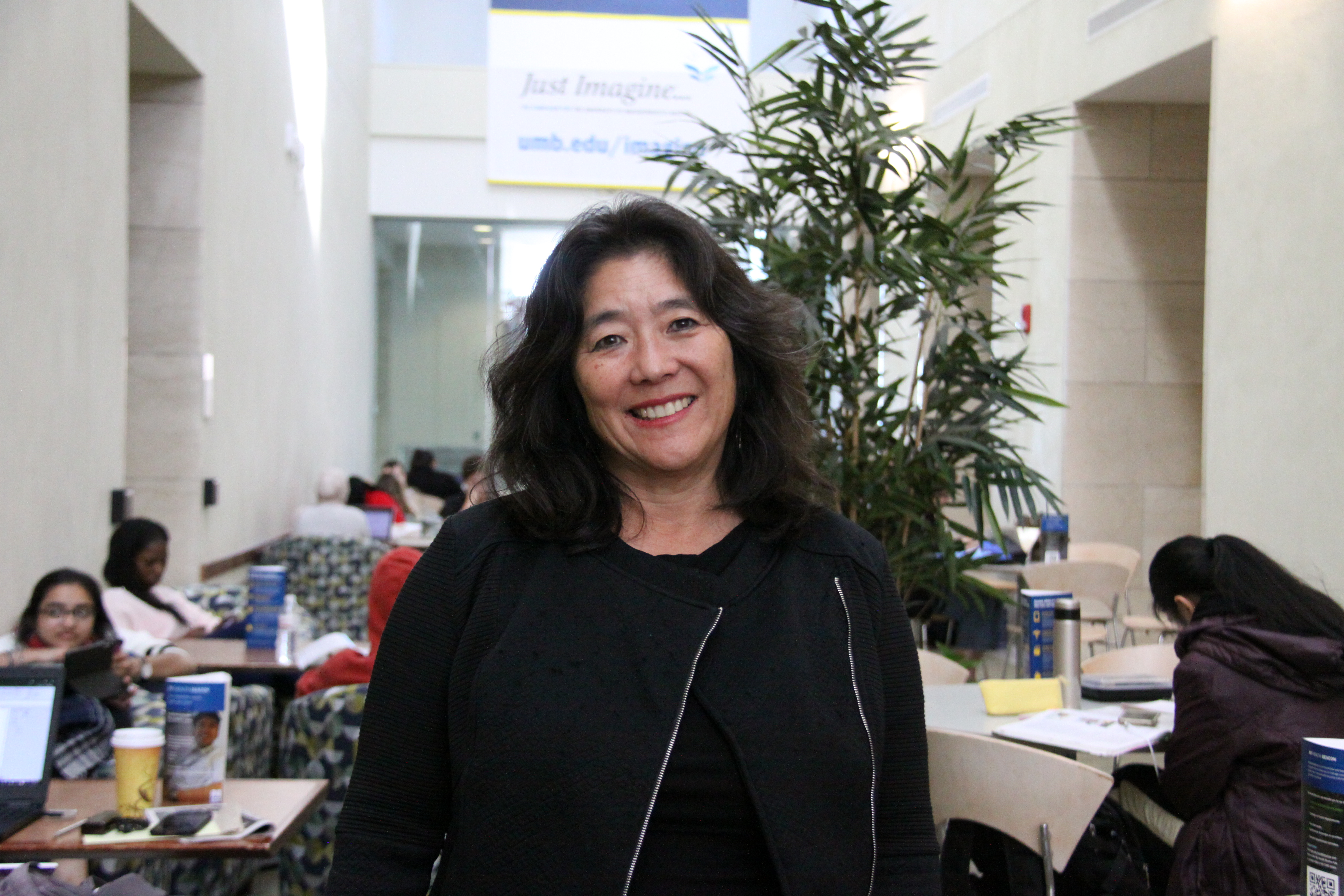
Cody Haddad, 19, transferred out of UMass Boston because he says he could not enroll in the courses required to graduate. (Kirk Carapezza/WGBH)
In March, University of Massachusetts President Marty Meehan brought in Barry Mills, a former president of Bowdoin College, to serve as interim chancellor at UMass Boston. His assignment? Stabilize the university's shaky finances. At the time, UMass Boston faced a $30 million deficit.
Since he took over, Mills says he's managed to cut that gap to $18 million and predicts it will drop even further by the end of the fiscal year.
"There is a path,” Mills told students and faculty at a campus-wide forum Thursday afternoon. “The hard part is that that path is not without sacrifice and hard choices that we've already had to make and hard choices that we will have to make and implement over the next weeks and months."
Now Mills is stepping down, saying he wants to make way for the UMass Board of Trustees to hire a permanent chancellor.
At the campus-wide forum, students said cuts made by Mills have led to fewer courses and faculty, making it more difficult to graduate on time - and with less debt.
Despite criticism, administrators say they've managed to mitigate the impact of the university's deficit.
That's reassurance not everyone is buying. Second-year political science major Maddie Walker, who works two jobs to pay her out-of-state tuition bill, said UMass Boston's cuts are affecting her academic career.
"I've been in classes where the teachers have said there might not be the latest edition of the textbook in the library because our request was turned down this year," she said.
Last semester, the 18-year-old from White River Junction, Vermont, considered transferring. Instead, she decided to get involved politically, raising awareness among students about the university's financial problems. Today, she’s the president of UMass Boston's chapter of the Public Higher Education Network of Massachusetts.
"If everyone just left because it wasn't working for them, then where would UMass Boston be?" she asked.
Hoping to reduce its deficit, UMass Boston administrators have consolidated course selections and offered several employees cash buyouts, including nine professors.
UMass Boston isn't the only public school struggling with finances. Moody’s Investors Services reports that last year nearly 40 percent of all public universities in the United States ran operating deficits. That’s up from 28 percent in 2012.
The Hechinger Report: Like Students, Colleges Are Increasing The Amount They Borrow
Faculty say all this institutional debt doesn’t come without consequences in the classroom.

Marlene Kim is president of the UMass Boston Faculty Staff Union. (Kirk Carapezza/WGBH)
Marlene Kim, a professor of economics at UMass Boston and the president of the Faculty Staff Union, said more graduate students are teaching courses so the university can increase its student-faculty ratio.
The Dorchester campus offers stunning views of Boston Harbor, but also not-so-stunning views of mounds of dirt marking the university's construction projects. That includes new dorms designed to attract more out-of-state students.
Advertisements wrapped around the construction site and coated on buses proclaim "New Is Happening" at the campus. It's an assertion Kim scoffed at.
"New is happening, the question is, ‘What is the new?'," she asked. "Are we losing our urban mission and are we moving away from students who need an affordable education the most?”
Joan Becker, Vice Provost for Academic Support Services, says UMass Boston has not abandoned these students.
"I think we’ve put a lot of things in place to ensure that students know from the very beginning what they need to do be on track," she said.
Even with fewer course offering, Becker thinks students with more coaching and mentoring are making better choices. And while she admits course consolidation has made it more difficult for some students to navigate their schedules, she said that hasn't been the case for everyone.
"They’re a lot of our students but they’re not all of students,” she said.
To get all of its students moving toward a bachelor’s degree, UMass Boston says it’s developing more straightforward majors.
The goal is to ease student transfers from two-year schools like Bunker Hill Community College to UMass Boston.
“They might say, 'I’m interested in humanities, or I’m interested in social sciences, or I’m interested in the arts,'" Becker explained. "So that then sets them on a more narrow pathway than this broad liberal arts pathway.”
And Becker says UMass Boston hopes to work with faculty to generate additional opportunities for students to do internships, earn credit during the summer and graduate more quickly.
Despite these university efforts, the deficit and course consolidation had already caused problems at the end of last semester for Cody Haddad of Taunton, Mass.
Haddad enrolled at UMass Boston last year and took a popular African Studies course that he quickly realized was overcrowded.
“[The] professor was absolutely amazing, but he said, ‘I have never taught a class this big. It’s usually 20 kids.’ We had 110!'” Haddad recalled.
Haddad is the first in his family to go to college and moved to Boston for his education. He took out more than $12,000 in student loans and worked 25 hours a week at T.J. Maxx on Newbury Street. He expressed a sense of betrayal from the way the system worked.
Frustrated he wasn't able to enroll in the courses he needed to graduate, Haddad transferred to UMass Dartmouth, where he is currently a student.
“I need to be able to pay off my loans and I wasn’t confident that I’d be able to get my degree in four years here,” he said.
Earlier: Can Massachusetts Support Four Public Universities?
WGBH's Esteban Bustillos contributed to this story.










